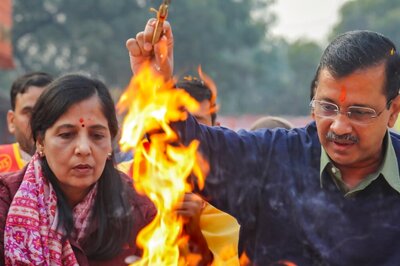
views
Indian airlines are facing very tough competition and the cost environment too is not in their favour, IATA chief Alexandre de Juniac has said, amid more than 25-year-old Jet Airways shuttering operations. India was one of the fastest growing domestic aviation markets in the world but growth turned negative in April mainly on account of Jet Airways crisis.
To a query on what could have gone wrong for Jet Airways, de Juniac said, in India, full-service airlines are facing some difficulties while low-cost carriers are doing a little better. Currently, India has two operational full-service carriers Air India and Vistara. The latter expects to start international operations in the second half of 2019. Speaking on the sidelines of the recently concluded annual general meeting, IATA's director general and the chief executive officer said high costs, adverse conditions such as fluctuation in rupee against the US dollar and strong competition were putting pressure on the profitability of airlines.
The International Air Transport Association (IATA) is a grouping of nearly 290 airlines. Jet Airways, Air India, SpiceJet and Vistara are among the members. About Jet Airways, which was a strong and contributing member of IATA, de Juniac said the airline's grounding was a pity and also reflects tough competition in the sector. "It tells us that the Indian market is tough due to macroeconomic conditions, the rupee, the oil prices and more generally the costs. These are putting pressure on the profitability of Indian members and it is a market where the competition is very tough," he told PTI in an interview.
Jet Airways, which had a significant number of domestic and international flights, temporarily suspended operations in April after it ran out of cash. To a query on whether the tough situation for airlines has also to do with their business models, the IATA chief replied in the affirmative but did not elaborate. Noting that cost environment is not very favourable for airlines in India, de Juniac said prospects for the airlines' industry are less positive than six months ago. "It is a global trend, which is more accurate and visible for cargo than for passengers. We still see strong demand in the passenger business," he added.
The global airline industry is expected to rake in a profit of USD 28 billion this year, much lower than the earlier forecast of USD 35.5 billion as rising fuel prices and weakening world trade are adversely impacting the business environment, IATA said earlier this month. On expectations from the new government in India, the IATA chief said taxes can be lowered, competition on fuel supply can be improved and more efforts being taken on regulating airports.
"Regulation of airports has been better. The previous government lowered some taxes... (it is) going in the right direction. Apparently, there is a strong push to extend airport capacity. Our concerns are taken into account. What we urge the government is to make decisions quicker," he noted. Among others, the grouping would like India to adopt revised airport slot allocation guidelines. IATA has been pitching for a single, independent slot coordinator. At the annual general meeting, a resolution on slot policy was approved and the grouping urged governments to adopt globally harmonised principles of slot allocation based on principles of certainty, transparency, sustainability and flexibility.
Regarding privatisation of airports, a proposition not encouraged by IATA, de Juniac said by principle it is not against or in favour of privatisation. "We just say be cautious before choosing that solution too quickly. Explore various options if you have on the table... If you want to attract private investors because the government can't afford as it is expensive and long term investment, we have a set of rules or guidelines that we provide to governments to run the concession process properly," he said. When asked whether country's largest carrier IndiGo would be joining IATA, de Juniac said the airline is more than welcome and expressed hope that one day it would join the grouping. Officials of IndiGo, which has nearly 50 per cent domestic market share, were present at the annual general meeting as the airline was extended a special invite.



















Comments
0 comment